Do you feel drained when talking to toxic people? Don’t know how to control or maintain a distance from them? It’s time to boost your emotional intelligence! Emotionally intelligent people can wisely handle toxic people as well manage their own emotions.
They seek out positivity and have a knack for being able to handle negative people. So, they can easily handle difficult situations in life.
Let’s find out how emotionally intelligent people handle toxic people.
Related: 8 Things That Emotionally Intelligent People NEVER Do
13 Ways Emotionally Intelligent People Handle Toxic People
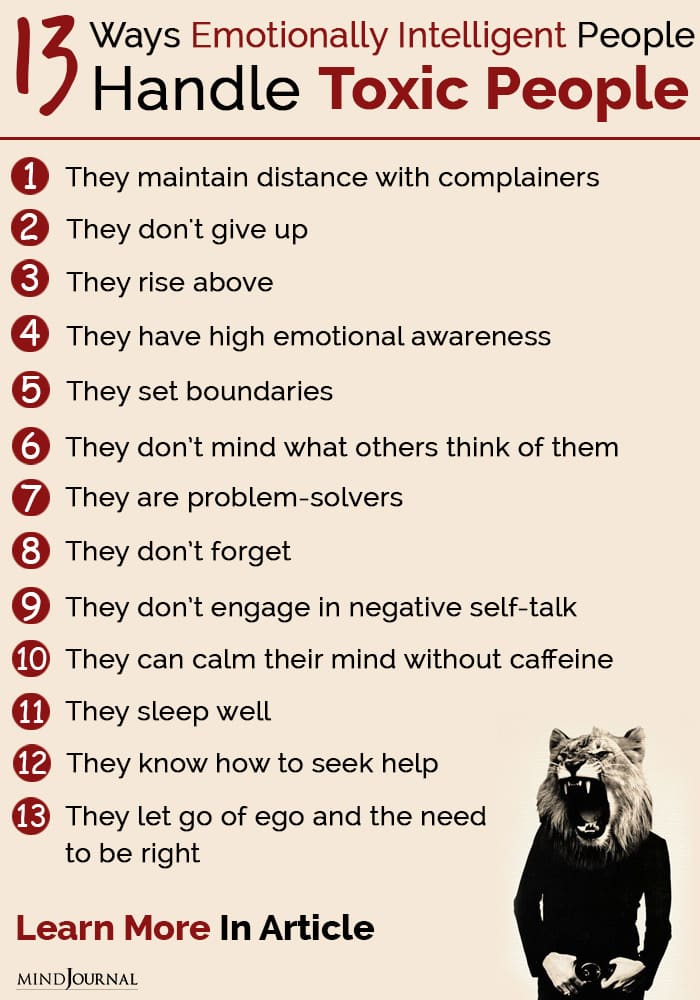
1. They Maintain Distance With Complainers
People with a negative mindset can only see the hole in the doughnut. They complain about anything and everything and drown themselves in self-pity. Due to the victim mentality, toxic people focus only on the problems and fail to come up with solutions.
Also, they transfer their negative energy to people around them to feel less shitty about themselves. Being sympathetic towards them is a foolish act. You will end up in a pessimistic loop.
When it comes to handling negative people, emotionally intelligent people set limits and distance even when they lend a sympathetic ear to a toxic person.
They can direct the conversation towards something that is more positive and productive when the victim rants about his problems. They will ask questions like what is your next plan? How would they like to solve the problem?
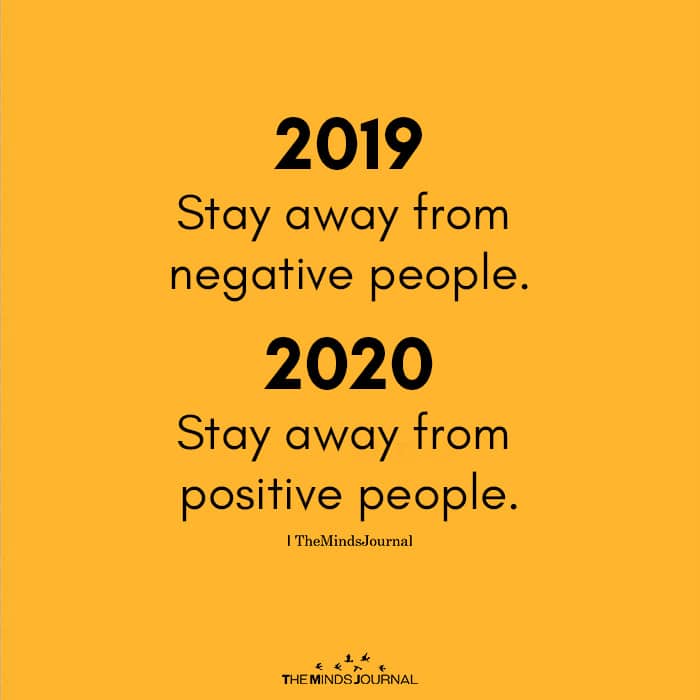
2. They Don’t Give Up
People who worked hard to become successful understand the need to try the 100th time even though they failed 99 times. They don’t lose hope and keep fighting with the toxic person.
Emotionally intelligent people understand and respond to emotions first. So, they pick the right kind of battles and hold their ground when the time is right.
3. They Rise Above
Toxic people are unreasonable and irrational. Giving an emotional response to their arguments will leave you emotionally drained.
Emotionally intelligent people don’t try to defeat them. They deal with such people like you deal with a science project – just respond to the facts, the emotional chaos doesn’t need your energy. They know that this is one of the best ways to effectively handle toxic people.
Related: 18 Signs You Are An Emotionally Intelligent Person
4. They Have High Emotional Awareness
Awareness is the key to emotionally distancing yourself from negative people. When you are aware of what you want and why you want it and have mental clarity, you will know when the trigger is happening. You can stop a mentally twisted person from triggering you.
Imagine a mentally unstable person calling you mad. What will you do? Try to correct him? An emotionally intelligent person will smile and nod. To straighten difficult people you need an emotional guard, proper planning, and time.
5. They Set Boundaries
Most people are poor at setting boundaries because they live with toxic people or in a toxic environment and are sucked into the chaos. Setting boundaries helps you rise above a twisted person, and predict their manners and behavior, and know when to put up with them and when you need not.
Be at the office or neighborhood, you might have to interact with a toxic person, but you don’t need to have one-on-one interactions just as you do with other colleagues or neighbors or friends and folks.
Without boundaries, you are sure to be consumed by difficult situations and unpleasant conversations. Those who consciously set boundaries are better able to decide when and how to talk to a difficult person.
By proactively setting boundaries, emotionally intelligent people tend to have control of things. You can stand your ground and manage people trying to intrude in your personal space, which they invariably will.
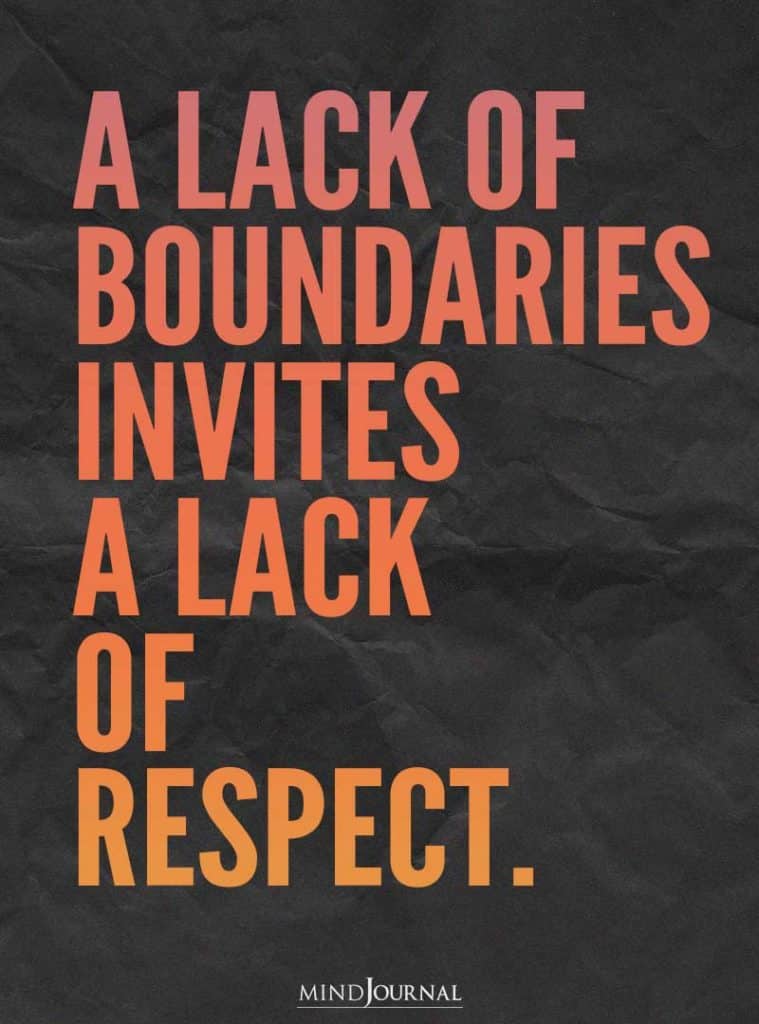
6. They Don’t Mind What Others Think Of Them
This is how smart people handle toxic people!
Emotionally intelligent people know how to be masters of their own happiness. They know their strengths and are satisfied with their achievements. They don’t compare their life and success with those around them. Being emotionally intelligent means having high self-worth.
They don’t seek validation or wait for others to appreciate them when they are proud of something they have done. What others think of them is neither the source of their pleasure nor distress.
Being emotionally intelligent doesn’t always mean you will be indifferent to what others are saying, but to take the opinion with a pinch of salt. You are not what others are trying to portray you to be.
In doing so you will have control over your joy and happiness. No one can manipulate you or break your confidence or limit your joy.
Related: 13 Things Emotionally Mature Men Do Differently
7. They Are Problem-Solvers
People with severe emotional distress focus their attention on negative experiences, and failures, and ruminate about problems, which amplifies stress and negative emotions. Emotionally intelligent people focus their attention on solving problems. As a result, they create a state of personal efficacy and lower stress levels.
Thinking about irrational and manipulative people will weaken your mind and make you more vulnerable to toxic people. So, think of strategies and how to handle negative people.
Control your emotions and take charge of your interactions with manipulative people. You can lower your negative experiences and enhance your emotional health.
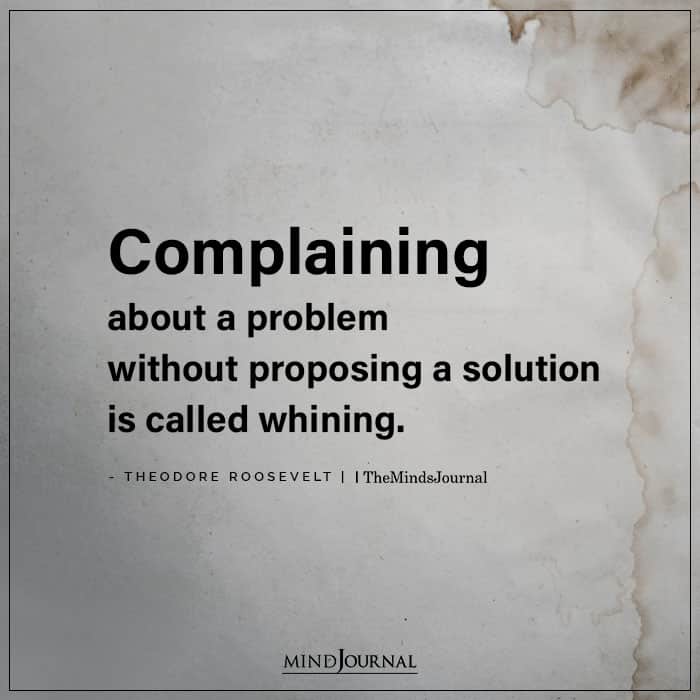
8. They Don’t Forget
Emotionally intelligent people may forgive the wrongdoers but don’t forget. They forgive so that they can move ahead in life. But, they will never give the wrongdoer a second chance.
This is the common quality of most mature and successful people in the world. Emotionally intelligent people are mindful of protecting themselves against similar harm in the future.
9. They Don’t Engage In Negative Self-Talk
Self-talk is the inner dialogue you have with yourself like “I have improved so much and I can do it better in the next exam and so on”. Negative self-talk is like “I’ve always suffered because of toxic people, I’m so weak, so I will continue to suffer”.
Sure, we all absorb negative energy from other people and do feel low and experience mood swings, when someone misbehaves with us. But, having a negative inner dialogue program, your subconscious mind is forced to think negatively, which intensifies negative emotions.
And that is manifested as relationship problems, issues at work, and so on. Therefore, negative self-talk creates a vicious negative spiral. So, why not engage in positive inner dialogue and manifest positive experiences in life?
10. They Can Calm Their Mind Without Caffeine
Caffeine may help you better concentrate on your work, but not handle toxic people. Stress is one of the side effects of excess caffeine consumption. So, an extra dose of caffeine when you are already stressed can affect the nervous system and give you jitters. You may end up making rash decisions.
Caffeine increases the production of adrenaline, which triggers the fight-or-flight response in us. This helps us deal with dangerous situations by either facing it and fighting or fleeing from the spot!
So, an adrenaline rush is a good thing when you are being chased by a wild tiger, but not so great when you need to talk to a toxic coworker at your workplace.
Related: 10 Signs You Are Dealing With A Childish Adult
11. They Sleep Well
Adequate sleep is essential for the human brain. It lowers your stress, recharges your memory, energizes your body, and increases alertness and emotional intelligence. This is why we wake up feeling refreshed and clear-headed.
Inadequate sleep increases stress hormones like cortisol increasing your stress levels without any stressor, attention span, and your memory.
Emotionally intelligent people sleep well, which is reflected in their positive and proactive behavior as well as the right state of mind when interacting with people or handling toxic people.
12. They Know How To Seek Help
How to handle toxic people? Do this!
It is good to be fiercely self-reliant! But, it is not always possible to solve your problems all by yourself. Everybody has their own strengths and weaknesses. And toxic people will always hit you on your weak areas.
Emotionally intelligent people have high self-awareness and identify their weaknesses before they go on to handle toxic people.
They also approach their colleagues at work, good neighbors and close friends, and folks to gain valuable insights and a better perspective on how to deal with difficult situations and toxic people. Using the best of their guidance, they overcome challenges.
13. They Let Go Of Ego And The Need To Be Right
Most people are stuck in endless drama because they just want things to happen in a certain way. But, emotionally intelligent people are not egoistic!
They can let go of the need to be right and prevent themselves from being pulled into whatever is happening around them. If you practice this exercise, toxic people can never suck you in.
Related: 11 Signs Of An Emotionally Intelligent Leader
These are things emotionally intelligent people do to handle toxic people. Although it seems a challenging endeavor, practicing will make you perfect. Over time, you will handle toxicity more effectively.
Are you ready to be emotionally intelligent and keep toxic people away? Do let us know your thoughts in the comments down below!
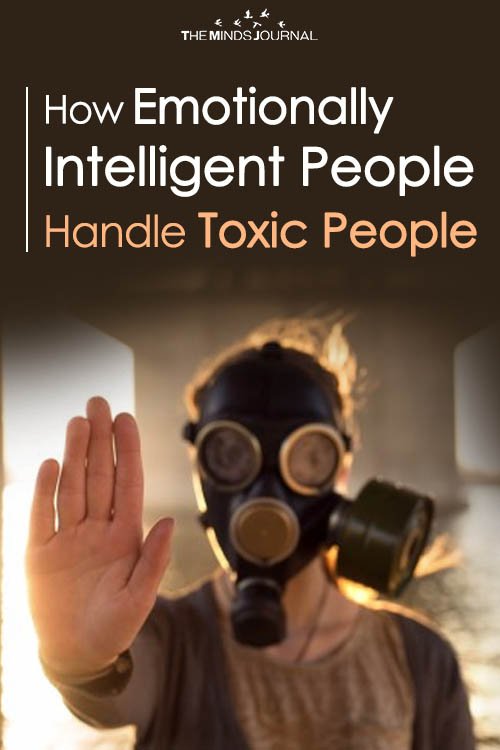





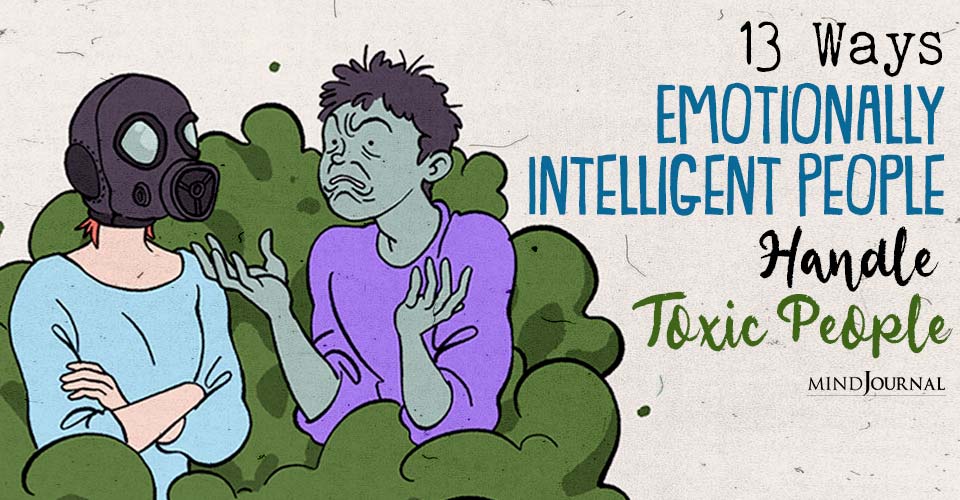







Leave a Reply